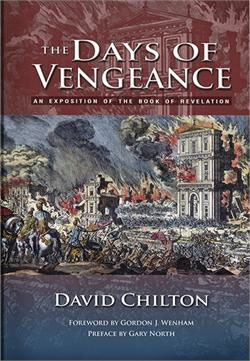Apr
19
2009
or The Feasts are the Key to the Revelation
All Christians recognise Christ’s fulfilment of Passover (crucifixion) and Firstfruits (ascension), followed by Pentecost. Futurists, who major on all things Jewish, recognise that Trumpets and Atonement follow, but they push them into the future.
Continue reading
Comments Off | tags: Acts, AD70, Against Hyperpreterism, Atonement, Dispensationalism, Herod, Holy war, Jezebel, Passover, Totus Christus, Trumpets | posted in Against Hyperpreterism, Biblical Theology, The Last Days
Apr
15
2009
The apostles were told to stop standing around looking into the air and to get to work. Futurists are like clock-watchers at work. They just want to go home and are distracted from the task at hand.
Read Are You a Schizophrenic Christian? by Gary DeMar
Comments Off | tags: Dispensationalism, Gary DeMar | posted in Christian Life, The Last Days
Apr
11
2009
Interpretive Maximalism

Need help combating those pesky liberal scholars who insist the Bible has been cobbled together and is nothing but an archaic shambles? Or those premillennialists who gasp in horror when you mention that the church replaced Israel? You need a strong dose of interpretive maximalism. It cuts liberal scholarship and dispensational nonsense to shreds. How? It shows, using repeated typology, that orthodox preterism and postmillennialism flow naturally out of the Old Testament.
Continue reading
Comments Off | tags: Dispensationalism, James Jordan, Postmillennialism, Preterism, Replacement Theology | posted in Biblical Theology
Apr
10
2009
or An answer for those who think modern day Israel has any special place in Bible prophecy.
After the scattering at Babel, the Lord tore the world in two by calling Abram. With the end of this large Division, signified by circumcision, there was no more distinction between the priest nation and the Gentiles. James Jordan writes:
Continue reading
Comments Off | tags: Abraham, Babel, Bible history, Dispensationalism, James Jordan | posted in Biblical Theology, The Last Days, The Restoration Era, Totus Christus
Apr
10
2009
Is there another choice besides Barthian gnosticism and the fundamentalists’ cultural retreat?
Van Til believed, along with Augustine, Calvin, Kuyper, and Klaas Schilder that the building of a Christian culture is a biblical imperative. Van Til castigated the Barthians for their repudia tion of a Christian culture. “For them,” he wrote, “there is no single form of social, political, economic order that is more in the spirit of the Gospel than another.” Christians today are hearing a similar refrain from within evangelical circles. If there is no specifically biblical blue print, we are left with a pluralistic blue print, no blueprint, or a postponed blue print (dispensationalism)…
Read It Takes More Than A Theory (Part 1) by Gary DeMar, here and (Part 2) here.
Comments Off | tags: Biblical worldview, Dispensationalism, Evangelicalism, Gary DeMar, Gnosticism | posted in Quotes
Apr
10
2009
Did God replace Judaism or merely put it on hold?
Being a Jew was never a matter of bloodline, but of Covenant. Think of Abraham’s servants circumcised in Genesis 17, the Egyptians at the Exodus, Caleb the Kenizzite, Rahab, Ruth, Uriah, etc. It seems the Old Testament keeps throwing us examples of people “grafted in.” The only actual bloodline of any importance is the one we are given, the family tree from Abraham to Christ.
Israel’s captivity and Restoration gave us a perfect picture of the New Covenant events. The Temple and walls of the old Israel were ‘de-created’ and God Himself (the ark) died in Babylon for the sake of a new Jerusalem with impregnable walls.
Christ was the human ark. Judaism, intermarried with Roman political power, became Babylon.
My point is, the captivity was a death-and-resurrection of first century Israel (the resurrection as predicted in Ezekiel 37) in type. The first century was the antitype. Thus, whatever remains of Judaism today is like exhumed idols from the eras of Jeroboam, Ahab*, Omri and Manasseh.
It is not about blood. It never was. It is about Covenant, and there is only one of those. Despite its various death-and-resurrection renewals, there has only ever really been one covenant. There is no replacement of God’s people, only transfiguration from glory to glory.
*Remember it was Jezebel’s daughter Athaliah that almost DID destroy this single bloodline that mattered. Jehoash was the single son who escaped, an echo of Moses and a type of Christ.
6 comments | tags: Abraham, Ahab, Ark of the Covenant, Athaliah, Babylon, Covenant curse, Dispensationalism, Genesis, Jezebel, Joash, Replacement Theology, Resurrection, Ruth | posted in Biblical Theology
Apr
10
2009
“Danger!” the dispensationalist pundits are shouting. “Watch out for replacement theology!” This specter of “replacement theology,” also masquerading under the pseudo-academic moniker “supersessionism,” looms ominously over Christendom. One blogger blogs, “One of the most dangerous and subversive doctrines held by adherents of Preterism, is the view that in A.D. 70, at the destruction of Jerusalem by the Roman armies, God’s covenant nation of Israel was superseded by the Christian church.” A website adds, “There is a demonic cancer coursing through the life blood of the Church of Jesus Christ and its name is REPLACEMENT THEOLOGY.” Yet another puts it bluntly, “This is a heresy . . .” Joel McDermon, Replacing Replacement Theology
Fight terminology with terminology. Throughout the Bible it is clear that God’s priestly nation went through many death-and-resurrection renewals. No one calls those ‘replacements.’ Can you imagine theologians arguing that Ezra’s Temple and Nehemiah’s new Jerusalem were only a temporary parenthesis, and that God would give Israel back their old kingdom?
The same thing exactly happened in the first century. Israel died and was resurrected anew. So, I propose new jargon – ‘Transformation Theology: don’t stay left behind.’
Comments Off | tags: Dispensationalism, Ezra, Nehemiah, Replacement Theology | posted in Biblical Theology, The Last Days, The Restoration Era
Apr
10
2009
Land.

I read David Chilton’s The Days of Vengeance in 1989, and it sure surprised me to learn that the word ‘earth’ in the Bible also means ‘land.’ This simple fact alters the scope of John’s Revelation entirely. It is about God’s ending of the Covenant He restored after the Babylonian captivity, and so first century Judah is the main subject. It was a repeat of events in Jeremiah’s day, so let’s backtrack a little…
Continue reading
15 comments | tags: AD70, Bible history, Compromise, David Chilton, Dispensationalism, Exile, Ezekiel, Noah, Resurrection, Temple | posted in Against Hyperpreterism, Biblical Theology, The Last Days, The Restoration Era
Apr
8
2009
“The French Revolution caused many Protestants to begin to consider whether there might be evils even worse than Roman Catholicism. Once it was clear that history had moved beyond the Papacy, many commentators shifted to a futurist approach to prophecy. They continued to roll all the bad characters in the Bible into one evil personage, this time not the Pope but some “Antichrist” who would appear in the future just before Jesus returns.
Few of these expositors seem to be able to resist the temptation to suggest, if not insist, that this “Antichrist” is due to appear shortly after their commentary is published. In this way, cultural bigotry has continued to inform most advocates of the futurist approach: The decline of European-American (nowadays called “Western”) civilization is identified as the final decline of Christendom and as a sign of the “last days.” The rest of the world does not count. Events in the Middle East and Europe are identified with Biblical prophecy and accorded status as signs of the end of the world. That this approach relegates the red, brown, black, and yellow peoples of the world to the status of historical non-entities does not seem to be noticed by the advocates of this unintentionally racist approach to predictive prophecy.”
James B. Jordan, The Handwriting on the Wall, p. 4.
Comments Off | tags: Dispensationalism, James Jordan | posted in Biblical Theology



























